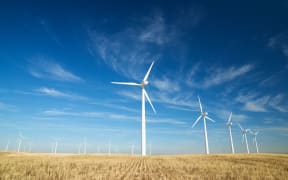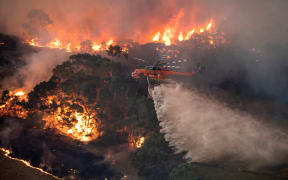
File photo. Photo: 123rf.com
If you're reading this, you're emitting carbon.
One online search uses about as much electricity as a light bulb left on for 35 minutes. Sending an email with a large attachment? That light bulb stays on for about an hour.
And, if digital technology were a country, it'd be the world's third-highest consumer of electricity behind China and the United States.
These are some of the findings featured in the French journalist and documentary maker Guillaume Pitron's new book, The Dark Cloud: How the digital world is costing the earth.
In a time where plenty of us are trying to be as environmentally conscious as possible - using re-usable shopping bags, bringing our own cups to the cafe - it's easy to forget a chunk of our carbon footprint comes from the devices we use daily.
But how did we get here - and what can we do about it?
Virtual world, physical cost
Even though they are not physically emitting carbon into the atmosphere, texts, emails and online searches all require energy to function.
"You don't think about it this way, right? Everything is virtual when you go online," Pitron told ABC News Breakfast.
"But actually, it has a cost. It has a physical cost… materials, electricity, CO2 emissions. The idea is to turn this idea of a dematerialised world into concrete."
Pitron has spent the last two years conducting research across four continents for the book, and he says it reveals the true anatomy of a kind of technology that is virtual in name alone.
"We need to have these technologies, right? I don't say that I'm not using a phone," he said.
"But at the same time, we need to be conscious that it comes at a huge cost which is exploding."
Emissions from digital technology mostly come from the resourcing and manufacturing chain - minerals like graphite and cobalt are crucial for batteries, and the mining process behind them comes with huge environmental impacts.
They also come from the energy required to run things that house and allow us to access our data, like modems and servers.
Then there's the "cloud" - the internet, broadly, and everything you can access via the internet, including all of our online data storage.
Overall, the latest estimates from EY show the digital world represents about 4 per cent of global carbon emissions - roughly the same as the emissions of Canada and Germany combined - and that's from late 2020.
Globally, streaming technology generates as much carbon as all of Spain - equal to around 1 per cent of global emissions. And the amount of energy used per stream also depends on what you're streaming on - for example, a HD TV requires more CO2 than a laptop or tablet.
"Behind each of the 70 metals and minerals that are in your smartphone, you've got a mine and you've got potential impacts that you need to be aware of - usually, mines which are somewhere other than Western world countries," he said.
"We've offshored pollution into third world and poorer countries."
And - while it's not yet known for sure whether we emit more carbon in our average physical or digital day, he says rising AI and a constantly expanding digital sphere will likely push the needle further over to the digital side.
Carbon cost-cutting
It makes for bleak reading. So, what can we do to reduce the carbon cost?
"The first thing we should understand is that pollution from digital technologies is mostly material. How do you reduce that? Well, you keep your phone longer, and you buy a second-hand phone," he said.
Even simple things like giving your online storage a spring clean and deleting duplicates, or files you no longer need, can help to reduce your digital carbon footprint.
"I've repaired my own phone six times for the last three years. And if you don't want your phone anymore, try to resell it. That's a way to keep the life span of your devices longer.
"That plays a huge role in mitigating such pollution."
- ABC





